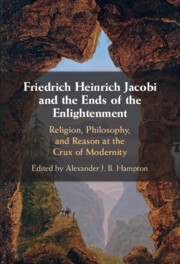 Friedrich Heinrich Jacobi and the Ends of the Enlightenment
Friedrich Heinrich Jacobi and the Ends of the Enlightenment from Part III - Jacobi and the Revival of Socraticism: The Muenster Circle and Existentialism
Published online by Cambridge University Press: 09 February 2023
Jacobi’s influence on the founder of so-called existentialism, Søren Kierkegaard, has rarely been examined. This chapter explores Kierkegaard’s critical and somewhat polemical discussion of Jacobi’s notion of the “leap” in Concluding Unscientific Postscript, which not only shows that Kierkegaard was acquainted with Jacobi’s major work, Concerning the Doctrine of Spinoza but how it shaped Kierkegaard’s own particular development of the salto mortale.
To save this book to your Kindle, first ensure no-reply@cambridge.org is added to your Approved Personal Document E-mail List under your Personal Document Settings on the Manage Your Content and Devices page of your Amazon account. Then enter the ‘name’ part of your Kindle email address below. Find out more about saving to your Kindle.
Note you can select to save to either the @free.kindle.com or @kindle.com variations. ‘@free.kindle.com’ emails are free but can only be saved to your device when it is connected to wi-fi. ‘@kindle.com’ emails can be delivered even when you are not connected to wi-fi, but note that service fees apply.
Find out more about the Kindle Personal Document Service.
To save content items to your account, please confirm that you agree to abide by our usage policies. If this is the first time you use this feature, you will be asked to authorise Cambridge Core to connect with your account. Find out more about saving content to Dropbox.
To save content items to your account, please confirm that you agree to abide by our usage policies. If this is the first time you use this feature, you will be asked to authorise Cambridge Core to connect with your account. Find out more about saving content to Google Drive.